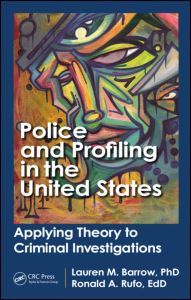Police and Profiling in the United States Applying Theory to Criminal Investigations
Auteurs : Barrow Lauren M., Rufo Ron A., Arambula Saul

Traditionally, criminal profiling texts have focused exclusively on the technicalities of conducting an investigation, but recent developments in criminal justice have encouraged greater consideration of the related fields of psychiatry, forensics, and sociology. Highlighting the current paradigm shift in criminology towards a cross-disciplinary understanding of behavior, Police and Profiling in the United States: Applying Theory to Criminal Investigations provides investigators with the insight necessary to view events, data, and evidence in the context of contemporary theory.
Topics include:
- Classical and determinist views on criminal behavior and social theories on crime
- Inductive and deductive logic and the dangers of fallacies in logical reasoning
- Childhood deviant behaviors and research on the historical search for an explanation of criminal behavior
- Developing typologies based on different criminal characteristics
- Sexually based offenses, serial and rage killings, and hero complex killers
- The critical role of crime scenes in investigations and the Locard exchange principle
- The value of geographic profiling in solving crimes and modern approaches such as COMPSTAT
- Balancing the role of victims in crime solving with concern for their well-being
The book concludes with scintillating profiles of 13 of the most notorious serial killers. Written in a practical and approachable manner, this book enables investigators to combine theory, instinct, and hunches with contemporary technology to construct a solid criminal profile.
Introduction. Disciplinary Contributions to Criminal Profiling. Leaders in Criminal Profiling. Theoretical Foundations. Historical Evolution. Classicalism. Neoclassicalism. Positivism. Determinism. Criminological Theory. Logic and Reasoning Practices. Fallacies. Deductive and Inductive Logic. Logic in Criminal Justice. Childhood Indicators. Historical Factors. Theory. Psychological Determinants. Sociological Determinants. Motives and Criminal Typologies. Motive. Motive Perspectives. Triggers. Intent. Criminal Typologies. Sociological Factors. Crime Scene Characteristics. Sexually Based Offenses and Motivated Crimes. Child and Sexual Abuse and Its Effects. Sexual Violence. Cycle of Violence or Abuse. Sexual Perversion. Cyber-Crimes and the Internet. Sexual Addiction. Sexually Violent Person. Voyeurism (Peeping Toms). Stalking. Love Stalker. Serial and Rage Killers. Types of Murder. Basic Demographic Profile. Past Profile. Types. Motivations. Causality. Hero Complex Killers. Primary Care Providers. Public Service. Crime Scene Indicators and Investigations. Crime Scene. First Officer on the Scene (Preliminary Investigator). Assessment of the Scene. Collection of Data. Chain of Custody. Locard Principle and Trace Evidence. CSA vs. CST vs. CSP? Geographic Profiling. Geographic Profiling. Distance Decay Theory. Bayesian Method of Estimation. Predictive Policing. CGT, GIS, COMPSTAT, CEWS, Blue CRUSH, and MAPS. Rational Choice Theory in the 21st Century. Social Disorganization Theory. Environmental Criminology. Broken Windows Theory. Victim Selection Characteristics. Lifestyle Theory. Routine Activities Theory. Conclusion. Research Methodology. Crime Scene-Based Approaches. Psychology-Based Approaches. Appendix: Profiles of Notorious Serial Killers.
Lauren M. Barrow, Ph.D.,is an assistant professor of criminal justice at Chestnut Hill College. Dr. Barrow teaches a wide range of criminal justice courses—including drug abuse, organizational behavior, criminal ethics, criminology, victimology, juvenile justice, and homeland security. She was a founding member of the New Jersey Alliance for Crime Victims with Developmental Disabilities. Dr. Barrow has conducted innovative research in the deaf community pertaining to its risk of victimization and authored a book entitled Criminal Victimization of the Deaf. She has instructed undergraduate and graduate students, both in class and online, for over ten years.
Ron Rufo, Ph.D.,is an adjunct professor at Kaplan University and also teaches at the City Colleges of Chicago. He has been a Chicago police officer for the past 18 years and has spent most of his career as a crime prevention speaker in the Preventive Programs Unit where he has given hundreds of presentations on profiling offenders, crime investigation, and street safety. Dr. Rufo has taught classes in crime scene investigation, police procedure, and policies and has been instrumental as a team leader in Chicago Police Department Peer Support Group. He authored the book Sexual Predators amongst Us and contributed to the book Terrorism and Property Management.
Saul Arambula, Ed.D., is a Detective with the Chicago Police Department. Over his 18-year career, Dr. Arambula has investigated hundreds of homicides, shootings, kidnappings, criminal sexual assaults, robberies, and other violent crimes and has amassed more than 120 total departmental awards. He is currently working in the Criminal Registration Unit of the Chicago Police Department. He is tasked with interviewing and registering convicted murderers, sex offenders, and arsonists. Dr. Arambula continues to work on numerous crime related research ventures and has a special interest in teaching.
Date de parution : 07-2013
15.6x23.4 cm
Thèmes de Police and Profiling in the United States :
Mots-clés :
Criminal Proling; Crime Scene; criminal profiling; Key Words; crime mapping; Violating; offender profiling; Geographic Proling; CIA; Sexual Oenders; Rat; Follow; Eir; Serial Killers; Young Man; Malice Aforethought; Animal Cruelty; High IQ; Unknown Suspect; Oender’s Personality; Analyzing Crime Scene; Crime Scene Investigator; DNA Evidence; NCVS; Munchausen Syndrome By Proxy; Criminal Event; Delinquency; Chronic



